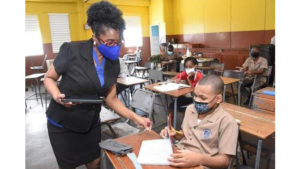 Prime Minister Andrew Holness yesterday put parents and school administrators on notice that face-to-face learning will resume for 376 of the island’s 759 primary schools on November 8.
Prime Minister Andrew Holness yesterday put parents and school administrators on notice that face-to-face learning will resume for 376 of the island’s 759 primary schools on November 8.
This will see the return of 45,390 students to classrooms for some level of physical learning weekly. He made the announcement in the House of Representatives while also announcing updated measures under the Disaster Risk Management Act, including the end of Sunday lockdowns, a day ahead of the expiration of the current measures.
Holness said the move was being made with the recognition that the resumption of face-to-face classes will come with some level of threat of novel coronavirus infection spread, but that it had to be done to stem the tide of learning loss affecting the nation’s children
“We are doing this knowing that reopening and sending our children back to school could also cause the numbers to increase. There is no perfect and easy solution. We believe we can manage the risk of outbreak by strategically allowing some children to go back and putting in place a measure to allow vaccinated students where vaccines are accessible,” Holness told the House.
One hundred and ninety-one, or half of the selected schools are small primary schools with enrolment of less than 100 students. The schools will be allowed to engage the cohort of students full-time or on a rotational basis.
“In all cases students of these primary schools must have some face-to-face learning every week,” he stressed.
Another 185 are medium-sized institutions with 630 students or less, where three streams of classes at each grade level will be targeted for face-to-face learning. For these schools, a rotation approach will be required, including virtual learning.
Holness said the education ministry will issue further advice about how schools will be ranked for risk, examining factors such as enrolment versus space, the number of COVID-19 cases in the communities in which the schools are located, access to water, technology, and the average distance travelled by students to and from school.
Holness stressed that the country must now move to the endemic stage of living with COVID-19, instead of continuing to treat it like a project.
Also, permission has been granted for high school students in grades 11-13 to return in small groups to complete lab and other practical assignments for their external examinations.
“We wouldn’t want our children to once again be deprived of the opportunity to sit their exams in a full and comprehensive way,” Holness said.
All unvaccinated parents, administrative staff, principals, and teachers, he added, are now being advised to get vaccinated, given the elevated risk of infection that will attend face-to-face reopening.
“We make a special appeal, especially to those who have comorbidities. As we cautiously send our children back to school the likelihood is that infections will increase,” he said, reminding that most of the students would be unvaccinated, and asymptomatic if they have the virus.
The reopening will see 2,520 teachers returning to classrooms.Meanwhile, the prime minister announced that what the population is now familiar with as lockdown Sundays will be eliminated. This will be replaced with daily curfew hours of 8:00 pm to 5:00 am from Sunday to Saturday, starting October 29 until December 10. All other measures remain in place, such as the gathering limits for churches, weddings, funerals, and burials.
He stressed that the country has to gradually move away from the measures and towards greater individual responsibility, but that this was not the time to make significant changes to the measures, as the country was still grappling with a third wave of infections, notwithstanding improvements in the numbers.
Holness warned that Jamaica could not risk a fourth wave, given its low vaccination numbers.
“The fourth wave is almost inevitable. Many countries are going through a fourth wave, but without the hospitalisations, because they have high vaccination levels,” he pointed out.
